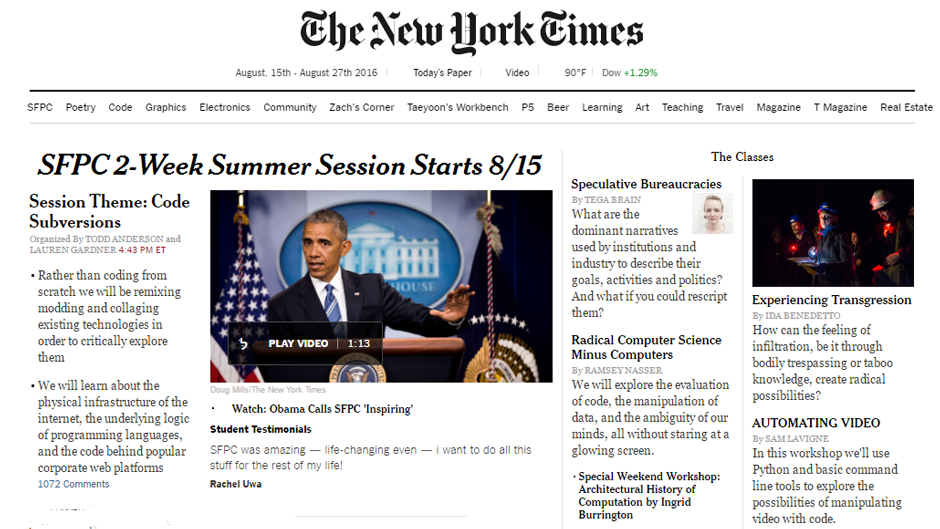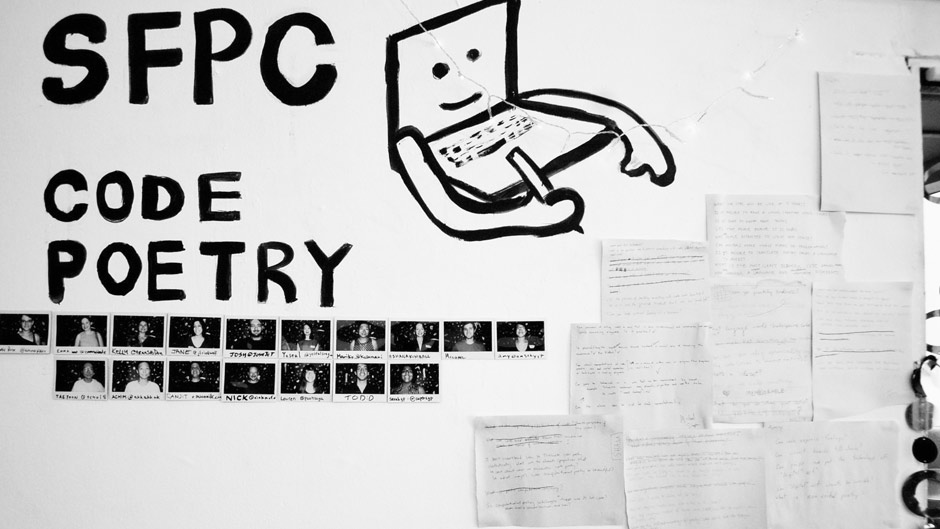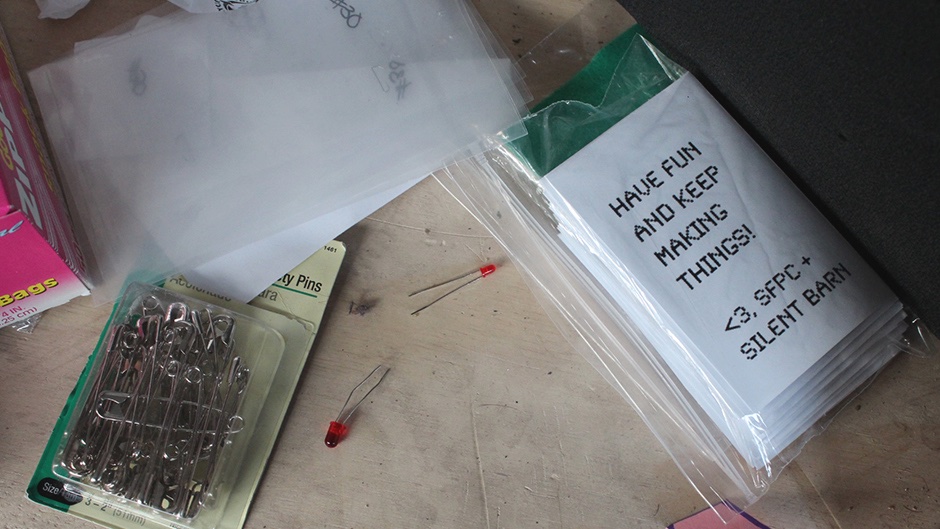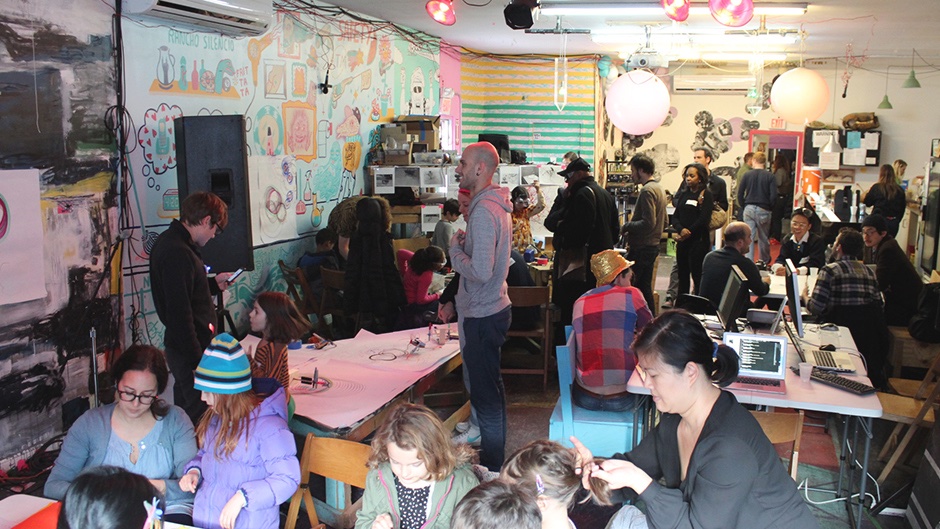Call for Students: Code Subversions
- Two-Week Session, Monday Aug. 15th – Saturday Aug. 27th
- @ SFPC, 155 Bank Street, West Village, NYC
- 7pm – 9pm, Evening Classes
Instead of coding from scratch, we will be remixing, modding and collaging existing technologies to critically explore them. We’ll learn about the physical infrastructure of the internet, underlying logic of programming languages and the code behind popular corporate web platforms. We will then use this knowledge to create playful projects that subvert the computational systems we use every day.
Who are the teachers?
- Ramsey Nasser - radical computer scientist, game-designer and educator
- Tega Brain - artist, environmental engineer, Processing Foundation fellow
- Sam Lavigne - data collagist, ITP fellow, Stupid Hackathon founder
- Ida C. Benedetto - transgressive place maker, experience designer, game maker
- Ingrid Burrington - writer, map maker, infrastructure demystifier
- Todd Anderson and Lauren Gardner are organizing the session. SFPC Team including Zachary Lieberman and Taeyoon Choi will provide additional support.
Classes
Speculative Bureaucracy // Tega Brain
In this class we will develop online interventions to rethink institutional agendas and critique mainstream tech culture. What are the dominant narratives used by institutions and industry to describe their goals, activities and politics? And what if you could rescript them?
We will look at the history of culture jamming and apply speculative design strategies, using the contemporary web as medium. Taking delight in the banal, we will experiment with basic web scraping, text manipulation and browser add-ons to provide a glimpse of the world we’d like to see.
Radical Computer Science Minus Computers // Ramsey Nasser
“I don’t need to waste my time with a computer just because I am a computer scientist” — Edsger Dijkstra
The foundational ideas behind computer science have little to do with actual physical computers or textual code. Together we will explore viscerally the evaluation of code, the manipulation of data, the ambiguity of our minds, and even start to think about what new programming languages could look like, all without staring at a glowing screen. The light we’ll cast on these core ideas will make any code you write or language you design in the future that much more powerful.
Experiencing Transgression // Ida Benedetto
How can the feeling of infiltration, be it through bodily trespassing, mediated projection, or retrieval of taboo knowledge, create radical possibilities? Ida will draw on her history of creating experiences in place you aren’t supposed to be to ground your code poetry experiments in the affective and interpersonal.
Automating Video // Sam Lavigne
In this workshop we’ll use Python and basic command line tools to explore the possibilities of manipulating video with code. We’ll treat video as a textual as well as visual medium, and focus on repurposing found footage to generate new compositions and narratives.
Architectural History of Computation // Ingrid Burrington
How do the physical conditions of the network influence our ideas about its history and politics? During this workshop, we’ll explore different sites in Manhattan relevant to internet infrastructure and history while developing methods for commemorating and critiquing that history with site-specific interventions.
What will happen in these two weeks?
Classes are held in the evenings Monday-Friday from 7-10pm. There will be a workshop during the first week on Saturday and the session will culminate in a party where students can invite their friends and share what they made and learned.
Students will have full access to the space for the two weeks of the session to work on projects between classes and mentors wil be readily available for technical, conceptual, and artistic guidance. Read our Participate page for more information.
How much is tuition?
$1,500 USD for the 2-week program. You’ll also need to cover your own cost of living, including housing and meals (recent alumni report this to be in the range of $800 - $1400). Upon payment, your space in the class will be reserved.
We are committed to being fully transparent about how we make and spend money. In the spirit of radical openness and generosity, on which the school was founded, we open-source our finances on Github. There, you can read financial reports and download raw statements.
What if I can’t go, can I get a refund?
- Yes, we can give you 100% refund up to 5 days before class starts
- 50% refund after 5 days, until the first day of class
- No refunds can be given after the first day of class
What is expected of me?
- Come to all classes and thoughtfully engage with your classmates and teachers.
- We are looking for autodidacts from all backgrounds who are curious, generous and open.
- We welcome students with a broad array of technical experiences–no coding experience is required, but a basic comfort level with technology is preferred.
- B.Y.O.Laptop (Mac / PC / Linux)
How do I apply?
Sorry, applications are now closed
We accept up to 15 students on a rolling basis. We will respond to your application within ~1 week of submission. Rolling admissions means there are fewer and fewer slots the longer you wait, so if you’re interested in the program get your application in early!
Where is SFPC?
We are located at 155 Bank Street, in the courtyard of the Westbeth Artists’ Community in Manhattan’s West Village, New York City.
Feel free to reach out to us if you have questions about the school: info@sfpc.io
SFPC is filled with amazing people and an open mindset to learning, and doing. It has taught me different ways of thinking, ones that I would be sure to bring back to my endeavors outside of the art world.
I'm half way through the program and I'm already missing being here. SFPC was a much needed breath of fresh air in my hectic creative existence, an unlikely place to stop and remind myself what was it I was into in the first place.
SFPC messed up my life a little bit. Actually, I think it's going to mess it up a lot. Before this program I thought I knew what I was doing and what the shape of my life was going to look like. Now I don't and each day I wake up scared I won't get to be a part of a community like this again. Everyday also now brings a fresh but welcome creative terror to overcome. Also I think I may have ended up moving to New York accidentally.
SFPC is the best place you can explore your interest as much as you want and the place you start to write your own poem.
SFPC is not really a school or a course — it is more like a door into an extraordinary world. It is driven by passion, kindness and the thrill of teaching and learning. I would love to live those inspiring weeks all over again.
SFPC was amazing — life-changing even — i want to do all this stuff for the rest of my life!
I've never been consistently surprised and inspired as much as at SFPC.
If you think SFPC is what you think, that will be wrong. SFPC is a space for a group of people who badly want to try something new. SFPC will become a spirit embedded in your blood which makes you think things with a different angle, just like its motto: more poetry, less demo.
I learned a lot at SFPC. It was only a 2 week program last time, but I learned many things from other participants and got the chance to explore and fail freely. SFPC helped me to reshape the way I think. It's your turn.
School For Poetic Computation is equal parts The Factory, childhood blanket fort, and mad scientist's lab. I learned a ton from the teachers and the whole SFPC community in a huge collaborative and exploratory environment.
Attending SFPC is like walking into an all day buffet supplied with food from hyper-talented chefs. There's more than you could ever consume, naturally, and you will most likely find yourself requiring a digestion period, but holy crap is it tasty.
My takeaway from SFPC: Never settle for code that isn't at least a little bit magic
In SFPC I found a great community and it gave me the confidence to take on coding projects I couldn't have done before.
SFPC is the purest, most honest exchange of knowledge and experience among peers I have ever experienced. It is a supportive space where everyone learns from everyone, and bridges are built that continue to be strengthened for years to come. You won’t get a certificate or a title at the end of it, but I would be amazed if you ever looked at your world the same again. I haven’t.






